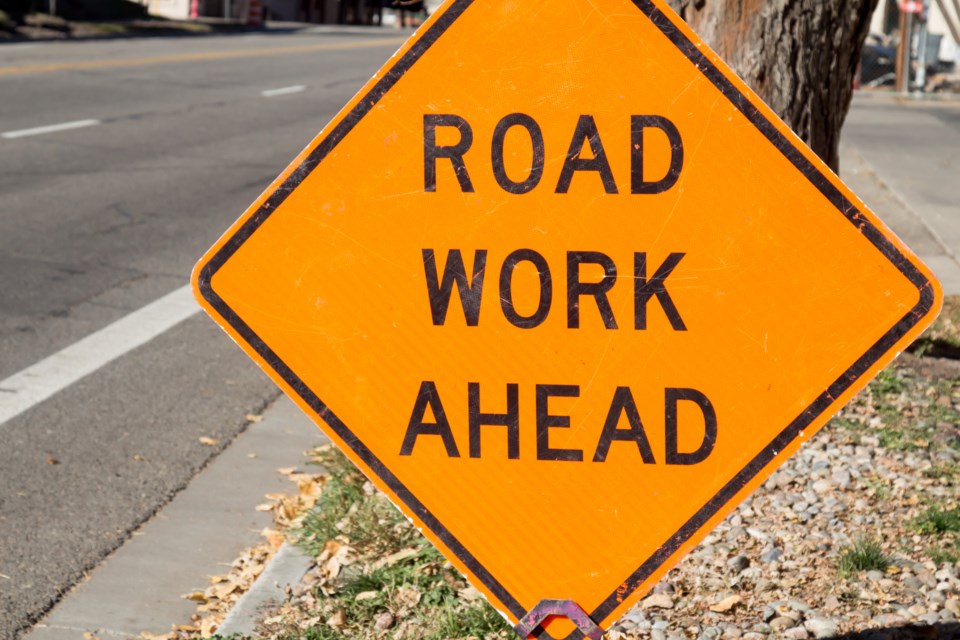The planned 2018 resurfacing and conversion of Bay Street from four to three lanes won't happen this year.
The $5 million road project is being put off, replaced by a Simpson Street reconstruction worth about half that amount.
"In order for the Bay Street project to proceed, some contingencies needed to be resolved," says Don Elliott, the city's director of engineering.
"A downtown traffic study is underway to address the question of one-way to two-way conversion of downtown streets," Elliott says in a memorandum to Mayor Provenzano and city councillors.
"Although that study ia progressing well, it is not likely it will be completed in sufficient time to complete the design and construction of Bay Street in the 2018 construction season. If the study recommends Bay Street be converted to two-way, then an addendum will be required to the Bay Street environmental assessment, and that will make it impossible to complete construction this year."
City planning staff also want to apply to the Federation of Canadian Municipalities (FCM) for a climate innovation grant for a Bay Street multiuse trail.
That fund is not presently accepting applications and is being re-evaluated by FCM with a possible resumption this fall.
City Council agreed last week to defer the Bay Street project for another year and to complete the Simpson Street reconstruction in the 2018 construction season.
"Staff will report back to council at a future meeting on the status of the 2018 capital roads program when tender values are known, and when [Ontario Ministry of Transportation] confirms whether or not connecting link funds are approved for Black Road," Elliott said.
No traffic study at Albert and Gore
In other news, city councillors have turned thumbs down on a $6,500 traffic study of controversial Albert Street intersections at Gore Street and Andrew Street .
The study was recommended by Carl Rumiel, a city design and construction engineer, in response to pressure from councillors to reinstall traffic signals removed during the 2016 rebuild of Gore Street.
Rumeil pointed out that Toronto-based traffic engineering specialist IBI Group Inc. is currently working on a downtown traffic study and an intersection safety study of the two Albert Street intersection could be added for just $6,500.
"I think we're looking for a reason to spend $6,500," kvetched Ward 5 Councillor Frank Fata.
"This is as bad an intersection, in my opinion, as the intersection at Korah Road and Douglas.'
"When people come into that intersection on Gore and Queen, they're speeding to catch the light at Wellington and Gore. That's part of the problem here. People are speeding and they can't respond in due course when people are coming through on Albert," Fata said.
Traffic warrants
Warrant studies done in accordance with Ontario Traffic Manual requirements have concluded traffic signals aren't recommended at the two intersections.
"It is the belief of city staff that with the passage of time, motorists will become more familiar with these stop signs and accidents will decline," Rumiel said."There is precedence for this. In 2001, the city removed the traffic signals at a very similar intersection at Queen and Andrew Streets. In the following year of 2002, there were 17 accidents at this intersection due to failing to obey the stop sign. This number is in line with the 18 accidents in 2017 at Gore/Albert and the 17 accidents at Andrew/ Albert."
"The next five years of accident data for the Queen and Andrew intersection showed a steady decline in accidents with six
occurring in 2003, six in 2004, four in 2005, three in 2006 and three in 2007. If this trend proves to be the case at the Gore/Albert and Andrew/Albert intersections, one would expect occurrences of accidents to decline here as well," Rumiel said.
Police entrapment?
City Police recently reported that over a five-day period, 41 drivers were charged with failing to obey the Albert Street stop signs.
Ward 6's Ozzie Grandinetti expressed concern about stepped-up police presence, referring to it as "entrapment."
"That's not going to solve the issue of that intersection by putting police there and handing out 41 tickets," Councillor Grandinetti said. "I know there are some people that blow the stop sign, but I think it's just entrapment."
Acting Mayor Rick Niro responded: "Police have not only picked that intersection. They're picking intersections that have high-traffic collisions."
"Clearly, people are not being attentive to the signals at that intersection," Councillor Niro said.
Ward 3 Councillor Matthew Shoemaker recommended against the $6,500 traffic study.
"I think our staff's doing a fine job monitoring the intersection. They're doing everything we asked them to."
"We've seen this at Conmee and Carmen's Way. We've seen this at Andrew and Queen Street. The accident numbers go up and then they go down," Councillor Shoe said.
Ward 3's Judy Hupponen asked whether the city might be held liable if there's a fatality on Albert Street.
City Solicitor Nuala Kenny replied: "As long as they are following the warrants it would be defendable."
"I'm satisfied by the work that has been done by staff to date, that it would be defended," Kenny said.
Ward 6 Councillor Joe Krmpotich pointed to the flashing lights at Base Line and Airport Road.
"Those flashing lights, I believe, are working," Krmpotich said. "It gives a good perception for those going north or south on that road and I believe the accidents are nil if any over the last couple years."
Doing the same on Albert Street would "probably a good idea," Krmpotich said.
City staff estimate it would cost at least $100,000 to reinstall traffic lights on Albert Street.
During the 2016 reconstruction of Gore Street, electrical conduit was left in the road in case the signals might one day be installed again.
